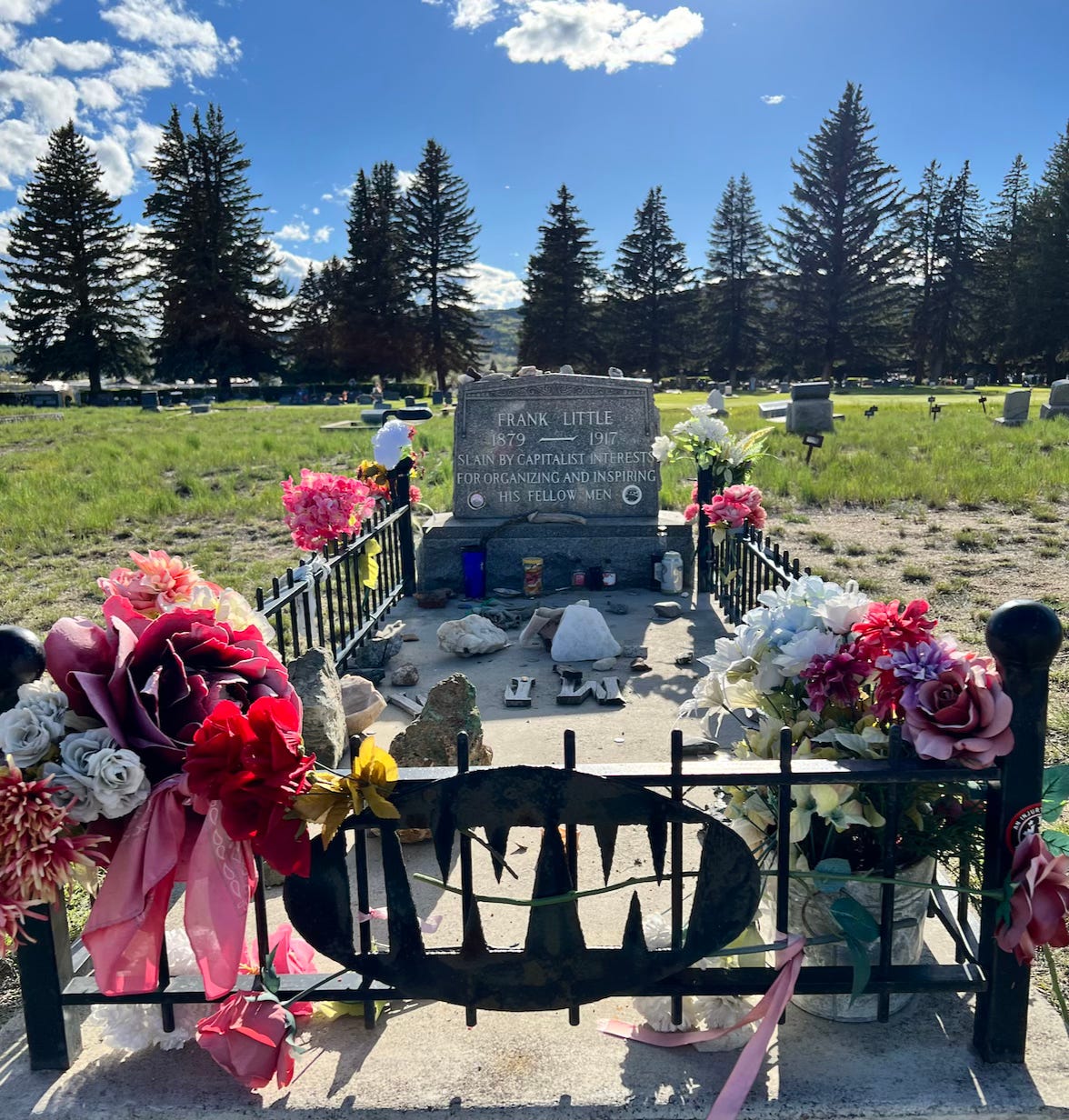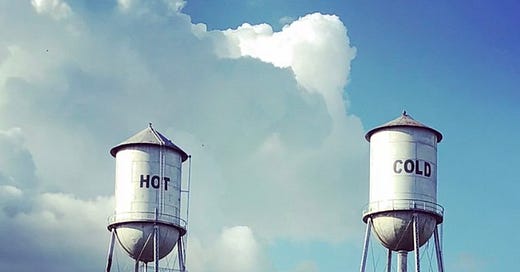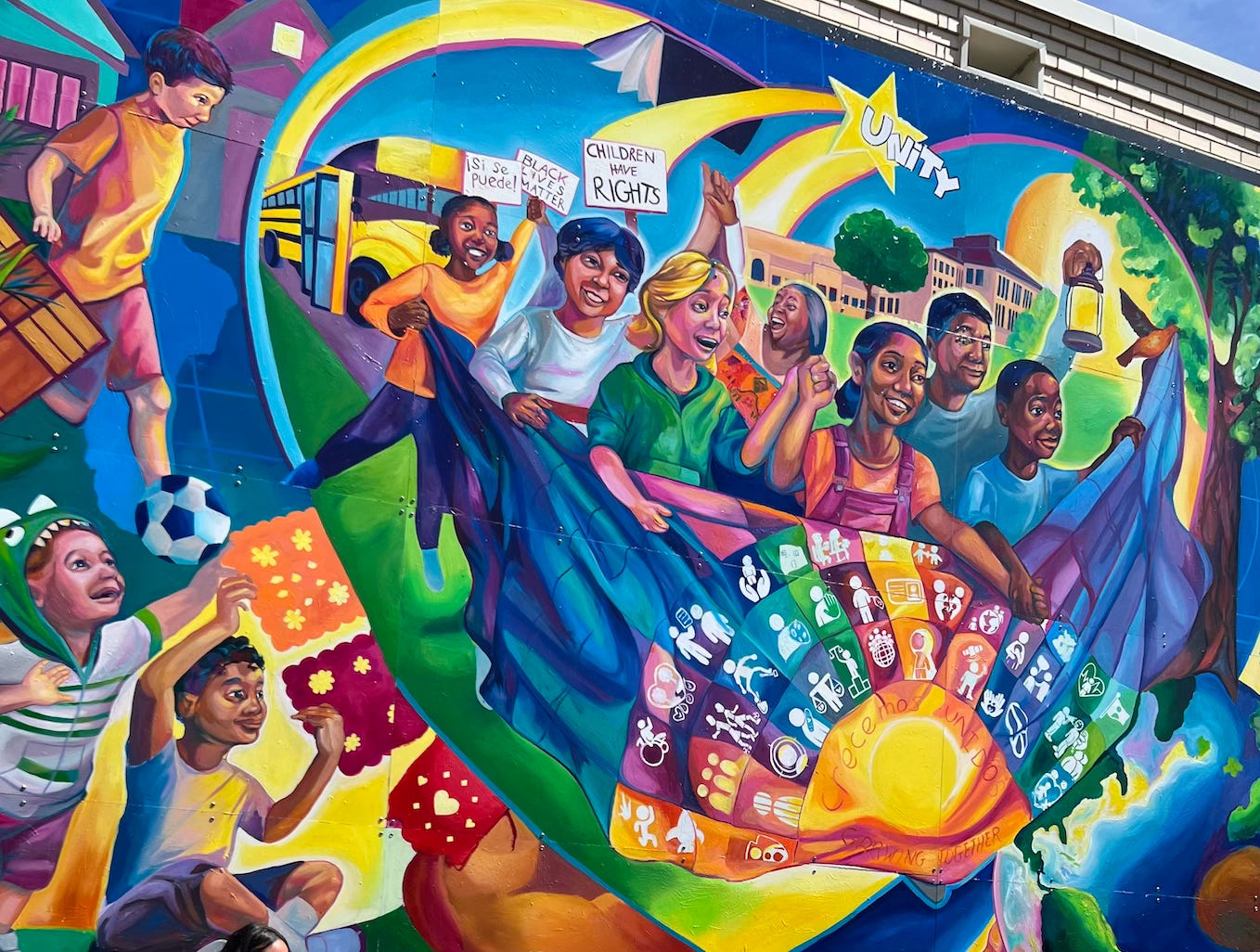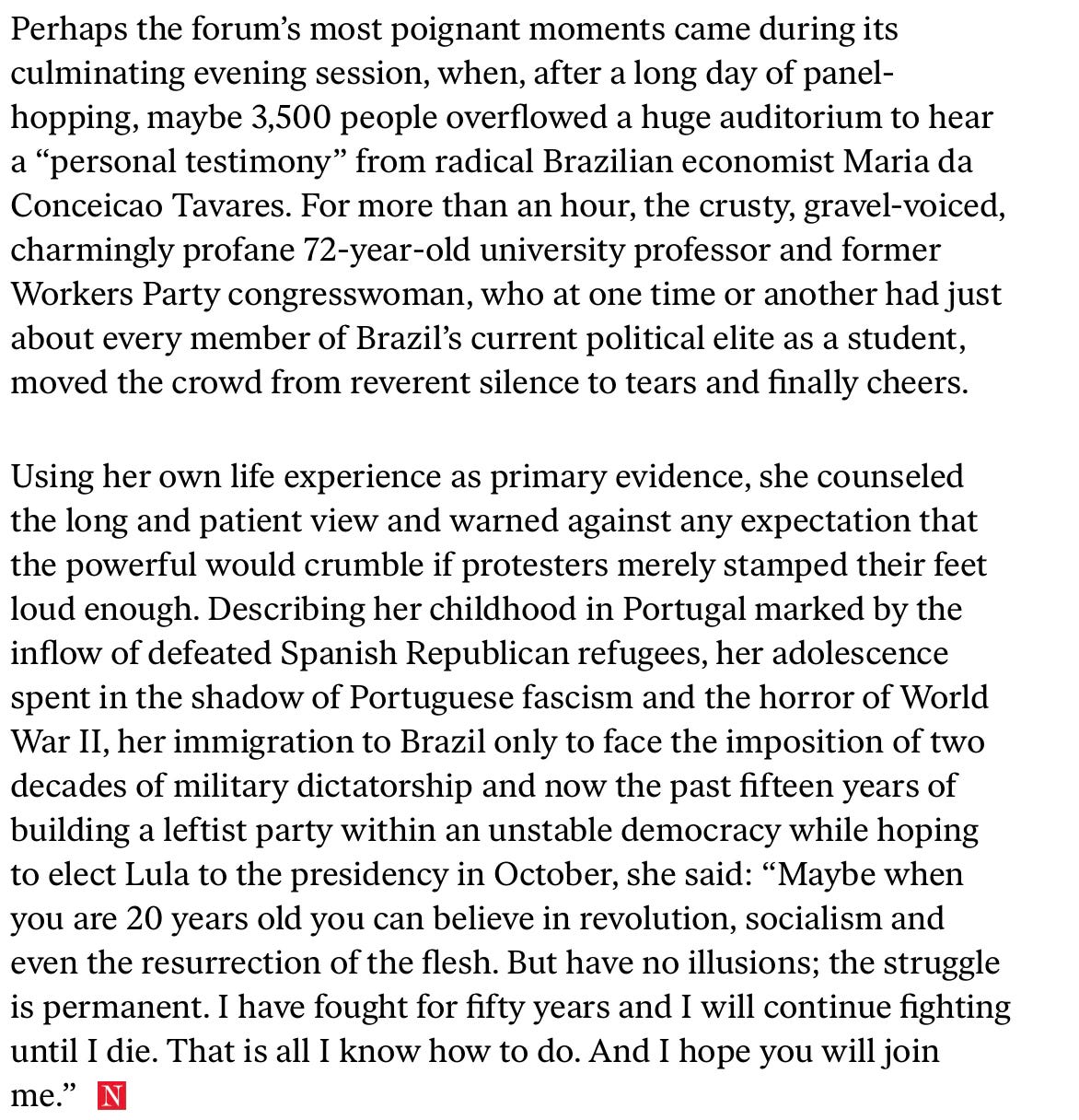I’ve only heard the story once, twenty years ago, and I’ve long since forgotten the details. It was told to me by a friend, a teacher in Ruleville, Mississippi. That’s Fannie Lou Hamer’s hometown, but the story takes place long after she passed away. My friend had a beloved student who died too young. The story was about the kid’s dad. In my memory, the dad drove a truck for a living, but that may be wrong. Everybody was so overwhelmed, a whole town of hearts ripped open. The kid was too young to die. All kids are too young to die. There was an open question at that memorial. What are we, the living, to do in a world where other people died too young? How are we to go on existing in a place where children disappear?
Again, I probably have the details wrong. The only fact I remember for certain was the way that the kid’s dad responded to all the people gathered there that day, looking to him for answers. He didn’t say much, but he said enough.
“We have all the time in the world, but none to spare.”

Some days, when I am running workshops, I catch myself spouting clichés. One of those lines is about how those of us who are building a more caring, less harmful world shouldn’t reinvent the wheel. All the lessons we need are in front of us, because there have been generations of activists who have already struggled and fought and loved and won.
I believe that statement, which is why I keep saying it. Multiple times in the past couple weeks, though, shortly after it left my lips I’ve been left with a very different thought, one which I didn’t share out loud.
Yes, but we haven’t gotten there yet.
We have won victories, but we haven’t yet arrived at a future where everybody is safe and loved and clothed and fed and free. And if that’s true, then that means that all of my activist heroes died before their work was complete. And, barring a miracle or a revolution unlike anything we’ve ever seen before, that will also be true for me, for all of us. More likely than not, when I die, there will still be castes and cruelty and winners and losers and some who have too much and some who have too little. There will be too much violence and too many tears.
One day we will all die and we may very well have done our best but the world will still ache.
Actually, that doesn’t get to the enormity of it all. As we know, history is often dialectical. Actions produce reactions. No matter how effective our moral arc bending, we may die at a moment when our best efforts aren’t just unfinished but are being actively undone.
A generation of abolitionists lived long enough to see slavery abolished, but died during Jim Crow.
A generation of labor organizers braved Pinkerton guns to build the American middle class, only to live to see Reaganomics.
A generation of women and others whose genders are villianized imagined a feminist future but now fear that their final years will be spent in a post-Dobbs America, a place where men commit multiple sexual assaults and keep getting elected President.
Millions throughout history have gone to sleep celebrating armistice and woken up to fresh rounds of gunfire.
This sounds fatalistic, and it might be, but it’s only part of the story. I am an optimist, even in this current political moment. I don’t blithely pretend that “everything is going to be all right,” but I trust that there is so much to do for each other, which is where hope comes from. I suspect that the stories of our neighbors’ sudden reactionary turn are more complicated than we are led to believe. I have been gratified by the thousands of people I’ve already encountered in just a few weeks who are still working, still helping, still caring.
There’s value in holding these two things at once. We can and will accomplish so much together, but there will still be more work to be done after we are finished. The world is on fire, quite literally, and we may very well exhaust the capacity of our buckets and hoses, but that doesn’t mean that we shouldn’t keep filling them with water.
Back to the subject of cliches. Martin Luther King Jr. was right, by the way. He didn’t get to the mountaintop. The day he was assassinated, he was fighting against poverty and war— two Goliaths that neither he nor generations of Davids who’ve come since have toppled. I don’t know what “we” he prophesied would get to the mountaintop, but it may very well still not be us.
Hope isn’t the promise of the summit, though. It’s the reminder that we get to keep walking.
That grieving dad’s koan has been running through my mind over and over again these past few weeks. So too has a series of questions.
How do we gauge the efficacy of our efforts to change the world given how slowly that change reveals itself?
What does a life worth living look like in a world that, for so many, is wholly unlivable?
How do we know that we are doing our best if we can’t trust that it’ll be enough?
I think I know a few of the answers, at least for myself, at least for this moment, but knowing them is different than living them..
Earlier this year, I published a memoir that is— in essence—about searching for and finding my own version of those answers. You can likely guess the arc, even if you haven’t read it. I spent too many years pretending that social action was about cultivating a pristine set of beliefs and repeating them loudly. I tried that for a while, but it mostly just left me feeling alone and self-righteous. The book is about how I realized how much more joy and possibility is to be found in caring very little about how right I was and instead simply trying to be more loving, more curious, and more interdependent.
It was a gift to write that arc, and to share that arc. In many ways, writing a book like that is an attempt at connection, but it’s also a bit of a plea. Connect with me, book buying public. And throughout this year, I have been lucky to have so many reach their hands out in my direction (coming to events, sending me kind notes, welcoming this newsletter into thousands of already overstuffed inboxes). In many ways, since writing publicly about seeking connection, I’ve more frequently been the recipient of it than the source.
There have been moments this year when I have taken my own advice, when I have reached my own hand out. I have! Perhaps some of you have experienced those efforts! But in all honesty, there are also so many moments when I have acted as if I have far more time to spare than is actually the case. I have chosen the comfort of my own ego, of self-preserving routines that have left invitations unanswered and old friendships pushed to the back burner. I have urged others to open their doors and host events that I have not hosted myself. I have responded to a handful of the messages that have filled my inbox but left others arbitrarily unanswered. I have talked to some of my siblings in the last month, but not all of them. I have burrowed.
I am not one to brand eras in my life, nor am I one to proclaim resolutions out loud. But right now, in this specific moment, I’m realizing that there’s a specific value in sharing an intention with you all. Starting now (because why wait for a new calendar year?) I am launching a tiny personal experiment. A year of connection, I suppose, though it’s hard to write those words without making the whole affair seem simultaneously too official and too trite.
The parameters for my challenge, as far as I’ve developed them, is a series of daily check-ins. I'm going to start the day asking “how am I going to either deepen an existing connection or build a new one?” I’ll then end the day by asking myself how I did. That’s the whole shooting match, mostly. Well, that and an unofficial push to make sure I’m not just doing the same thing every day. Some days, I will respond to the kind note I received three years ago. Other days, I’ll reach out to the author whose book changed my life but I never thanked. I’m hoping that on some days, I’ll be brave enough to mend relationships that still feel strained and bandaged. And yes, I will be hosting soup and pie suppers at some point, hopefully more than once.
A year from now, I’ll write to you all with an update on how it went. Perhaps there will be interstitial updates as well.
I do all this not as a substitute for whatever overtly political action will be required of in this moment, but to strengthen it. The more people to whom I am connected means more communities whose fight is my fight. The path, I imagine, will keep making itself. Some times an outstretched hand becomes a defiant fist. That’s what we do when people with whom we are connected need our solidarity.
I don’t know how far we’re going to get in building a better world, you all. I hope very far. I have reason to trust that we will get to celebrate frequently, that in our remaining lifetimes there will be days when we will joyfully pour into the streets again. We will clang pots and pans and Cupid shuffle and hug strangers and yell “we did it!” That’s a wish, though. I don’t know it for certain. All I can say definitively is that I will regret every day that I live in separation from my neighbors— both near and far. There is much to bemoan about the world. But there’s also you all. Out there. With your sorrow and confusion and big open hearts. How can I help but try to connect more and more each day.
It’s true, by the way.
All the time in the world
But none to spare.
End notes:
It isn’t lost on me that I’m writing about being more intentionally connective during the mad holiday rush here in America, a time when so many of us (disproportionally women, especially in the context of heterosexual relationships) are doing so much to connect, but often with a great deal of baggage attached. Every year, I’m trying to get a little better at re-centering what and why I’m doing all this— the gifts and the holiday cards and both family and community social events. I’m still figuring that out, but it felt like naming my intention to connect now might help matters. Also, and I mean this. In the past couple years, I’ve become a holiday card-sender family. If you feel connected enough to me (for whatever reason) that you’d like one, just email me. I spent too many years overthinking “how well I need to know somebody to send them mail,” but no time like the present to stretch a bit. My email address is garrett at barnraisersproject.org.
Speaking of being connected, you may have noticed that, for the past couple weeks, I’ve kept comments to paid subscribers only, which on a purely selfish level has been very nice both for discussion management side and subscription nudging. I’ll continue to do that many weeks, but not this one, for obvious reasons.
On the subject of paid subscriptions. Oh jeez it’s Giving Tuesday, a day I dread both as a recipient of emails and as somebody whose livelihood and ability to do caring work in the world is entirely dependent on people clicking buttons online and saying “yes, Garrett, thanks for trying… I will support you.” What a rickety system we’ve built, you all. And also, it’s real. Every week, a few more people click subscribe to this newsletter, which in turn helps me spend less time piecing together other ways to learn a living and instead offer more trainings, more workshops, more coaching, etc. So damnit I’m sorry for another email in your box with a button to click but also, sincerely, thank you. I’ll be a good steward of your support. Oh, and our subscriber community rules. Truly. I don’t think you’ll regret joining it.
Relatedly, new Barnraisers workshops are coming in the new year (free, of course, and focused on supporting folks trying to hold and build local community spaces). If you’re not on the interest list, you can do that here.
Very connected to this week’s topic, if you’ve known me for a while, you’ve likely heard me tell the story of Maria da Conceicao Tavares’ speech to the inaugural World Social Forum, but I don’t think I’ve ever shared the full context in which I discovered it. Here’s the two paragraphs that have haunted me since I first read them in 2002, from Marc Cooper in The Nation.
You’re getting a song of the week with this issue, because this one arrived in my life right on time. It’s “Gott nitt år” (“Happy New Year”) by Annika Norlin and Jonas Teglund. Bear with me on my clunky translation here, Swedish friends, but here’s the line that I’ve been repeating.
“Och historien har lärt oss/Folk är cykliskt korkade
men sen förhoppningsvis äntligen cykliskt smarta”
Roughly, in English:
“And history has taught us/that people are cyclical stupid/but hopefully, in the end, cyclically smart.”
The full Song of the Week playlist is available on both Apple Music and Spotify.







I'm reminded of a moment early in my time at Earlham. I made some cynical, flip comment about voting to Phyllis Boanes, assuming that because of her socialist political leanings that she would eschew electoral politics and agree with me. She looked me dead in the eye and said, "People died so I could vote. I always vote." She wasn't saying that she expected the election outcome to be what she wanted and that's why she was voting. She was saying, essentially, I am part of a chain of action and I owe it to the people who came before me to honor them by taking that action they fought so hard for me to be able to take.
This was a humbling moment, but a necessary one for me. Not only because ever since I always vote, but also because I got very clear about what my obligation is to the people who came before me.
I do agree with the other commenter who named that it is Whiteness (and I would add Maleness) which teaches us we can expect to get what we want in our individual lifetime. I think the further away from those identities you are, the more you have to accept the reality of your own individual efficacy. And, honestly, I HATE IT. Having grown up with parents who were activists, carted to my first protest when I was in a brown corduroy Snuggly on my mom's chest, I want to believe that we're getting somewhere better than where we were when they began passing the torch to me. I'm TIRED, and disheartened about the world my own kids are aging into adulthood as a part of. But I'm trying to remember those early Quaker women I've mentioned here before, who were imprisoned and tortured simply for having the audacity to preach in public. Like Phyllis, I owe them. Not to complete their work, but to honor their struggle by carrying things forward whatever few steps I can manage. That's it. That's the entirety of what I can expect to accomplish. I wish it was more than that, but it's not and never has been more than that.
I love this so much. My mother-in-law died last month, and the thing I've been most surprised about is how many people have come together to support my wife and me. Dropping off food, sending care packages, watching our dogs — community has been so bolstering. But I've also been surprised by how much strangers have helped and supported us. Some of them because it's their job, but more of them because we've come across them in situations (renting their AirBNB, arranging care for my wife's grandmother, etc.). It struck me recently that I knew that many of them didn't share my politics and yet, we were connecting and showing up and their kindness changed my experience. I certainly don't believe in entertaining folks who don't believe in the basic dignity of the marginalized, but I do believe that it's our connections and willingness to engage with other people in a positive way that will help us begin to repair the divided America we live in. I've been brainstorming how to engage more deeply with my community (I recently read about a family that does an "open door Thursday" where they serve snacks and people can come by to play games or hang out and just be with others and I'm wondering about doing something like that) and also how I can go beyond donating to causes in my area and start being in community with people. This post was a great reminder -- I'm saving it for later when I need the encouragement.